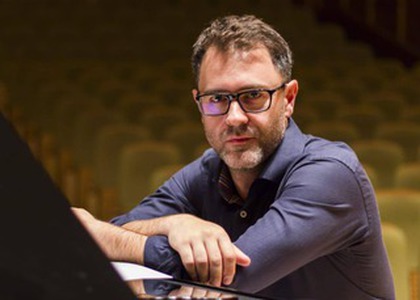> [Archived] Interviews

Interview with pianist Ștefan Doniga
Violinist Diana Jipa and pianist Ștefan Doniga will carry out a complex cultural project between the 15th-27th of January, 2023, dedicated to both the 350th anniversary of the birth and 300th anniversary of the death of Dimitrie Cantemir, a key figure of the Romanian political and cultural landscape. We learn about the details of the tour entitled "Three centuries of Romanian music - from Cantemir to the contemporaries" from pianist Ștefan Doniga.
Mr. Stefan Doniga, what are the most important aspects that led you to choose to celebrate 300 years of Romanian music by evoking the work of Dimitrie Cantemir?
We started from the way we have been doing our cultural projects over the past years, which is to turn these endeavours of ours into something much more than cultural acts. We have turned them into appeals to culture, to look into our culture for aspects that guide us in our daily lives, that help us, educate us, form us, and the year 2023 happens to be a very generous year for Romanian culture, with many celebrations, many cultural, historical and especially musical commemorations. So, out of all these celebrations, I have chosen the one of Dimitrie Cantemir, because, behind his personality, there is a very interesting and very important trajectory for Romanian music.In his scientific, historical, artistic, not to mention political and even military work, we find directions that will lead Romanian culture into the 21st century. This is why we have chosen to call our project "From Cantemir to the contemporaries - Three centuries of Romanian music". In fact, we follow the trajectory of Byzantine influence in Romanian music. That's how we built this project and we followed this thread, from Dimitrie Cantemir, then Anton Pann, to contemporary composers.
You were talking about the influence of this personality over the years in the works of other Romanian composers. Can you give us some examples of such composers or works?
This program includes, beyond works signed by Dimitrie Cantemir and adapted into a violin and piano version by our good friend Vlad Răzvan Baciu, we go through works by Anton Pann revised by Mr. Ioan Dobrinescu, also for this version of violin and piano (because we also support this project with the pair that we have established in our projects, namely, I'll play together with violinist Diana Jipa), we go on with the music of Paul Constantinescu, of Mrs. Carmen Petra Basacopol, and we even reach the contemporary creation of master Ulpiu Vlad.We also go through works that are very dear to us, by Mrs. Felicia Donceanu, by Grigoraș Dinicu or by another celebrated personality of this year, violinist and composer Ion Voicu. Here, then, is a plethora of composers, creators and extraordinary artists in whom we have identified this root of Byzantine music, which undoubtedly originated from the genius of Dimitrie Cantemir.
Apart from the recital that encompasses exclusively Romanian works, that you will perform with violinist Diana Jipa, what other activities have you included during the tour?
We included everything we could, what we thought we could do, physically and technically - because it must be said that this project won the selection organized by the Ministry of Culture for the National Culture Day. It is with pride and joy that I say, this is the third year in a row that we have won this selection, so we had to score as many points as possible. Therefore, before each of these five recitals, there will be a conference held by a historian on topics related to the life and work of Dimitrie Cantemir. We have distinguished guests: first of all, as in the previous project dedicated to Nicolae Titulescu, we are joined by Prof. Cristina Păiușan-Nuică, researcher at the National Museum of Romanian History. But, in each of the same concert evenings, we will launch a different online video of a work that we present in the program, a video opened by an interview with Mrs. Cristina Păiușan-Nuică, also on topics related to the life of Dimitrie Cantemir.Again, an interesting fact is that each of these videos is filmed in a place of great historical or artistic importance for Romanian culture. And, on top of all that, there is also the launch of the cantemir300.ro website, that will hopefully last beyond this "Cantemir year" of Romanian culture.
In which cities will you go to carry out this project dedicated to Dimitrie Cantemir?
Our trajectory is as following: we start this Sunday, on the occasion of the National Culture Day, on January 15th in Focșani; then, on Friday, January 20th, we will be at the "Constantin Silvestri" Hall of the National University of Music Bucharest; on the 24th, for the Little Union Day, we will be at the "Ion Dumitrescu" Philharmonic in Râmnicu Vâlcea, the next day, on the 25th, we will be at the Medicine, Art, Culture Conferences organised in Cluj, and we will end the tour on the 27th, at the "Ioan Sima" High School of Arts in Zalău, together with our good friends from Zalău.
Translated by Andreea Zofotă,
University of Bucharest, Faculty of Foreign Languages and Literatures, MTTLC, year II
Corrected by Silvia Petrescu














